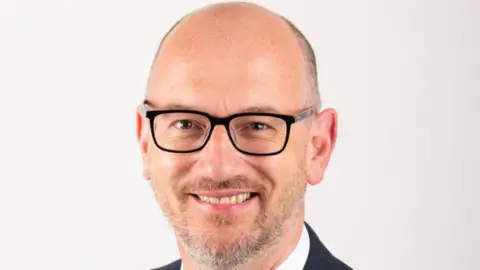[ad_1]
 Rainbow Project
Rainbow ProjectLGBT young people have been “failed” in the education system in Northern Ireland for many years, it has been claimed.
Alexa Moore from the Rainbow Project organisation was giving evidence to assembly members (MLAs) on Stormont’s education committee.
MLAs on the committee are carrying out an inquiry into how relationships and sexuality education (RSE) is taught in schools.
Ms Moore also said it was important to integrate “LGBT relationships, identities and experiences throughout the curriculum.”
“Without exceptionalising it, without making it a ‘OK, so here’s the LGBT content and now we’re going to discuss LGBT people,’” she continued.
She was giving evidence to MLAs alongside Sophie Nelson from HERe NI, which supports lesbian and bisexual women.
Ms Nelson also referenced the fact that four women had been killed in Northern Ireland in six weeks.
“We have an epidemic here of gender-based violence and the prevention of this needs to start in school,” she said.
At a previous hearing it was claimed that some sixth-form pupils were called bullies for expressing a view that homosexuality was wrong.
The claim was made by a representative from the Presbyterian Church in Ireland (PCI), Dr Andrew Brown.
Ms Moore said it was important to create an “inclusive environment” for discussions in RSE.
“But that doesn’t happen by saying ‘OK, is homosexuality wrong? Yes or no? Put your hand up if you think yes, put your hand up if you think no,'” she said.
“It singles people out and it also serves to ostracise and marginalise the LGBT young people who might be in that room.”
‘Debate on right or wrong’
Ms Moore said the two organisations held focus groups to talk with young people about their experiences of RSE.
“Many people just hadn’t heard of RSE, these were kids maybe aged 14 to 17,” she said.
“Some of them were doing their AS-levels, doing their A-levels and they hadn’t heard of RSE.”
She said many young people said they had only been able to discuss the topic as part of religious education (RE).
“It often turned into like almost a debate about whether being gay was right or wrong,” she said.
“I’m sure you can imagine how that would make an LGBT young person feel within that space.”
Ms Moore told MLAs about her own and her family’s experience at school.
“I received RSE within the past 10 years, and it was one session within an assembly with virtually no mention of LGBT identities,” she said.
“My sister went into school just after I started transitioning, so she knew what a trans person was,” she later told MLAs.
“She knew what a trans woman was, and not being able maybe to discuss that within school or not having teachers who are equipped maybe to deal with that when those topics come up can be quite detrimental.”
 Pacemaker
PacemakerQuestions over ‘illegal’ prescriptions
 NI Assembly
NI AssemblyDemocratic Unionist Party (DUP) MLA Peter Martin raised the Cass review during the hearing.
The Cass Review, which looked at gender identity services for under-18s, said there were “gaps in evidence” around puberty blocker drugs.
“The review found that not enough is known about the longer-term impacts of puberty blockers for children and young people with gender incongruence to know whether they are safe or not,” the report said.
An emergency ban on puberty blockers was subsequently extended to cover Northern Ireland.
Mr Martin asked why the Rainbow Project linked to an organisation called Gender GP on its website.
“Gender GP under a section that says ‘what to do if your child’s puberty blocker is running out’, and it says some of these solutions include taking their prescription to a pharmacy abroad or getting the prescription created in the name of someone who is over 18,” Martin said.
“Is that something you’re aware of as an organisation?”
“The puberty blockers decision is really challenging for a lot of young people and their families, they’re really struggling to know where to go,” Ms Moore replied.
“Many of these people have been on puberty blockers for a long time, or maybe not a long time but a year or two, and they’ve been kind of starting their medical transition.
“We don’t necessarily have a view on Gender GP, it is just one of the services that is out there for people.
“There are many views on all sides around that.
“The reality is whenever families and whenever supportive parents are pushed into a corner, they’re going to do what is best for their child.
“It’s unfortunate that they have been pushed into that corner. We don’t know of anyone who is doing this.”
Martin responded that “advocating to create scripts in the name of someone else isn’t a good idea, it’s illegal.”
The committee chair, Alliance MLA Nick Mathison, said the questions from Martin had “widened out beyond the terms of reference of the inquiry”.
[ad_2]
Source link freeslots dinogame telegram营销




